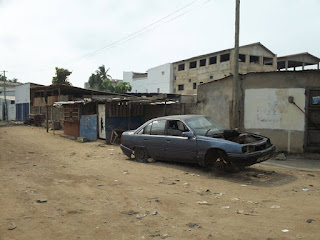Piot connects these various threads, arguing that the performative nature of the former dictatorship’s hold on power (staging coups d’états to maintain a state of emergency, for instance) has been echoed in the dramatic personal connections with God performed in Pentacostal churches, the fake identities performed by those trying to obtain a visa to the US through the lottery, the imagined magical performances of witches and the self-portrayal as needy in order to capture the interest of an NGO. Each of these performances is an act of conjury that attempts to generate something of value out of nothing—reflecting, Piot argues, the influx of cheap disposable goods that entered the country after the Cold War and the accompanying culture of accumulation.
Such performances are also related to rumor and the problematic nature of truth. Following Walter Benjamin, Piot writes that the return of death (due to a drastically weakened economy after foreign governments cut aid at the end of the Cold War) has brought a need to tell stories. “Death demands explication—and here elicits competing stories… but far from stabilizing meaning and bringing closure, storytelling produces its own excess—more stories, more versions of the same story, more ambiguity in any story’s ‘true’ meaning.” Under such circumstances, supernatural explanations involving witchcraft seem less irrational.
He writes that Togo is a country that is rejecting its past: trying to move away from the history of dictatorship, increasingly joining a new religion that very actively demonizes traditions of old, eschewing local familial bonds in favor of direct contact with distant, global communities. This rejection of the past creates an anticipation, a longing or nostalgia for the future, as well as an imaginary of exile.
What do you mean, “an imaginary of exile”? Apparently, there were more green card visa lottery applications per capita in Togo in 2003 than in any other African country, and ten times as many as in neighboring Benin. People devote their lives and large sums of money to attempts to leave their home nation. When local ceremony no longer provides entertainment, satellite TV and the internet connect one to the spectacles of distant places. I remarked, as we entered into the country, that even the location of the capital suggested this desire to leave. Situated directly over the border, a short walk past a heap of trash (welcome to Togo!) and along the coast, the capital is about as close to Ghana as possible without being out of the country (it also seems, from the map, that most roads enter the city from the Ghanaian side, rather than the Togolese side).
The city felt, in places, like a ghost town, the set of some post-apocalyptic movie. We wandered down empty, unpaved streets, in the middle of the road, and wondered where everyone was. Gorgeous colonial mansions facing the ocean left to crumble, abandoned, make you almost want to buy one to fix up—it could be a dream home, easily. I’ve noticed that both Accra and Lomé feel less dense, less city-like than Dar es Salaam or Kampala (although most of my observations here should be taken with a grain of salt, since I so far haven’t explored either of these West African cities as much as the East African ones).
Wandering through the capital near our hostel:


We did find people, later: we watched large groups of people working together to pull in fishing nets from the ocean, as we made our way along a beach that was too beautiful to be as empty as it was. (The ocean breeze also makes for *perfect* weather!) At night we walked down a street lined with outdoor bars blasting music that Piot tells me may have been preaching the word of Jesus. If so, that didn’t stop anyone from drinking, or members of large family gatherings from periodically standing up to dance. Vendors wove through the tables, selling cigarettes, condoms, clothes—just about anything. Another busy site of human activity was the “grand marché,” which we passed through twice, once on Sunday morning and once on our way to the fetish market.
The fetish market is Lomé’s biggest tourist attraction: a market full of items apparently used in traditional, non-Christian worship. The market might not quite be a gimmick—we did see one traditional healer arrive and immediately be swarmed by vendors hissing to attract his attention—but it certainly seems to rely on the tourist trade. As soon as we entered, we were told to pay an entrance fee and offered a guide. For an additional fee, we could take pictures, and it was explained that most of the items on display were for tourists, and didn’t yet have any power (the magic that makes them powerful was done elsewhere).
Piot explains that the “charismatic Christians” (meaning those belonging to Pentacostal churches) blame such traditional beliefs for all evils, including a lack of development. Rather than hybridizing the religion, as colonial churches did, charismatics condemn all activities involving spirits (but nevertheless believe in their existence and efficacy).
We wandered through a rather deserted patch of dusty earth, past tables stacked with the dried heads (and various other body parts) of monkeys, dogs, lions, antelopes, horses, elephants, and others, all laced with the smell of death and preservative that called the Murambi genocide memorial to mind. Our tour-guide explained that most of these body parts would be ground up into powder that you would wash your body with in order to achieve the desired effect. Many of the other objects were things that had once had a function (as money, as a writing utensil, etc) but due to improving technology, had been repurposed for magical use, as though anything that belongs to the era of tradition now belongs to the murky realm of magic.
Fetish market:

Once we’d seen our fill of dead animals, we were brought into a back room, where various charms were explained to us, from the flat, round object that would enhance memory if you used it to draw a cross on your forehead and then tucked it under your pillow to the stick whose smell apparently functions as a natural Viagra. There was also a trinket called “Tell Me Yes,” which, if used correctly, was supposed to make your romantic interest agree with you on everything (as long as s/he was the first person you saw afterwards). Interesting that people have told stories of trying to capture love with magic for centuries, all around the world…
Much of what we saw in the fetish market and what I read about witchcraft in Piot reminded me of the fairy tales we read in Magic class last spring. At the time, we talked about how those stories came out of the dire conditions of the time they were written in, as people developed ways to talk about poverty and death. Similarly, Piot writes, “Witchcraft narratives are very much discourses about hard realities—about unequal access and the failures of European development, about the il/legitimate constitution of political authority, about the temptations of illicit wealth production. They are concise, albeit allegorical ways of trying to understand shifts in power’s operation in today’s world.”
The witches that live in Togo are not shopping for dried monkey heads at the fetish market. They’re capturing victims to sell in exchange for money and the accumulation of goods and advanced technology. They represent the ability to make something out of nothing, the goal that those who are nostalgic for the future are reaching for.
Oh, and we also went to an art gallery holding the collection of West African art gathered by a wealthy Swiss anthropologist, who even negotiated the return from Portugal of some rare art from Benin. Beautiful art, shown to us by a construction worker in a work shirt and dirty overalls, who had no issues with us touching things (or, um, putting them on our heads…):






